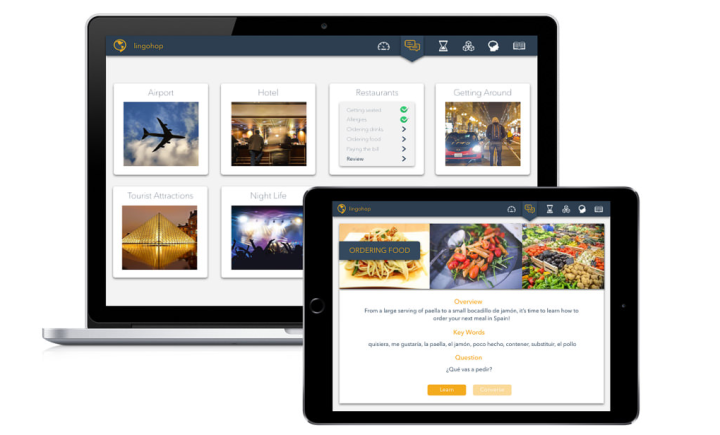
But a new language-learning web platform, Lingohop, wants to debunk that “one-size-fits-all” approach by offering a more contextual, personalized method that matches your goals and what you want to learn. It revolves around the conversations we have everyday, and rather than starting with the fundamentals, the platform breaks the process down to topics — ranging from Airport, Hotel, and Restaurants, to Tourist Attractions, Getting Around, and more.
When you first enroll in the service, you can set your goal, for example, “trip preparation,” and (if that’s your choice) further describe what kind of a trip it will be, and how much time you have before you leave. All of that information is then used to calculate how much of the language you have time to learn. That means based on what you input, Lingohop will personalize your entire experience, taking into account all the details in your trip to create a relevant, useful experience. It’s up to the user to decide the degree of fluency they want to gain.
Once you choose a topic, you’ll then face a series of four-minute lessons. For example, if you’re about to meet with a client in another country, choose the relevant topic and then you’ll be taught how to make formal introductions with clients in a span of four minutes. The lesson starts with a question and answer pair, and as you progress the program will grow to include relevant words and phrases surrounding the question and answer.
“The brain absorbs language the same, and actually more efficiently if what you’re being presented has relevance to your needs.”
“By the end of the lesson, you’ll confidently be able to ask and answer questions for the situation, and have all the tools you need to converse with a native,” says Michael Ashley, president and CEO of Lingohop, in a video. “We’re helping you ditch the phrasebook and get back to the conversations that really matter.”
What about learning the fundamentals? Traditional learning methods would say basic vocab and sentence structure would go a long way in setting up the foundation of how someone learns a language. But Ashley disagrees.
“What linguistic research has actually shown and covered, especially within the 21st century, is that with the particular mix of auditory and visual cues, it doesn’t matter what the context is,” Ashley told Digital Trends. “The brain absorbs language the same, and actually more efficiently if what you’re being presented has relevance to your needs.”
So three months before your meeting, learning specific phrases like formal introductions with clients, is more helpful than reciting “the apple is red” in your target language. But that doesn’t mean you’re thrown into a host of difficult sentences and words — Ashley says the platform does build users up slowly so as to not overwhelm them, but “you don’t have to start with things you’re never going to end up using.”
Lingohop recently launched on Kickstarter, and the company is looking to raise $25,000. If it hits the mark, the service will open with Spanish (Mexico and Spain), French, and English (U.S. and England). If it goes past $25,000, the company has stretch goals set up to unlock new features, such as Italian at $50,000; an Android and iOS app at $100,000; and German at $150,000. As of publication, Lingohop has raised $6,717 of its goal, and it has 33 days to go.
The company was founded by a group of students — Ashley, its chief product officer DJ Hammett, chief research officer Ramón Padilla-Reyes, and vice president Tsavo Knott.
The app also tracks how well you learn in different environments, and at what times you perform best. There’s also a social dynamic, where you can compete with friends, set goals for a group that is learning together, and see how well your friends are doing.
Right now, the Kickstarter has a $45 option for backers, which would give lifetime access to the full language suite. The retail price of that equivalent is $200, but when the service kicks off there will also be a month-to-month subscription option. If everything goes well with the campaign, Lingohop will launch in November.


